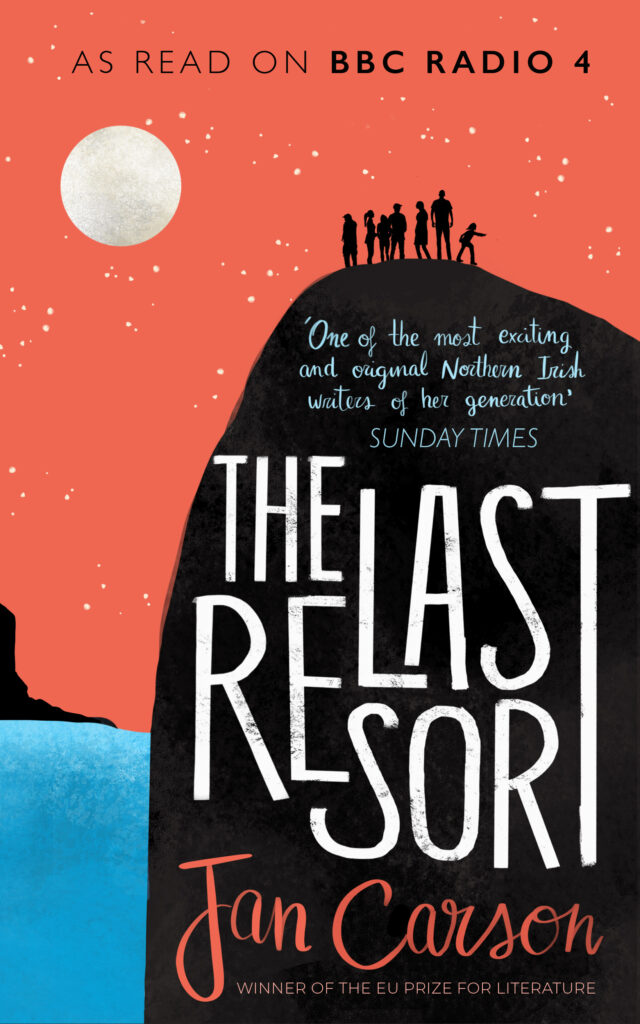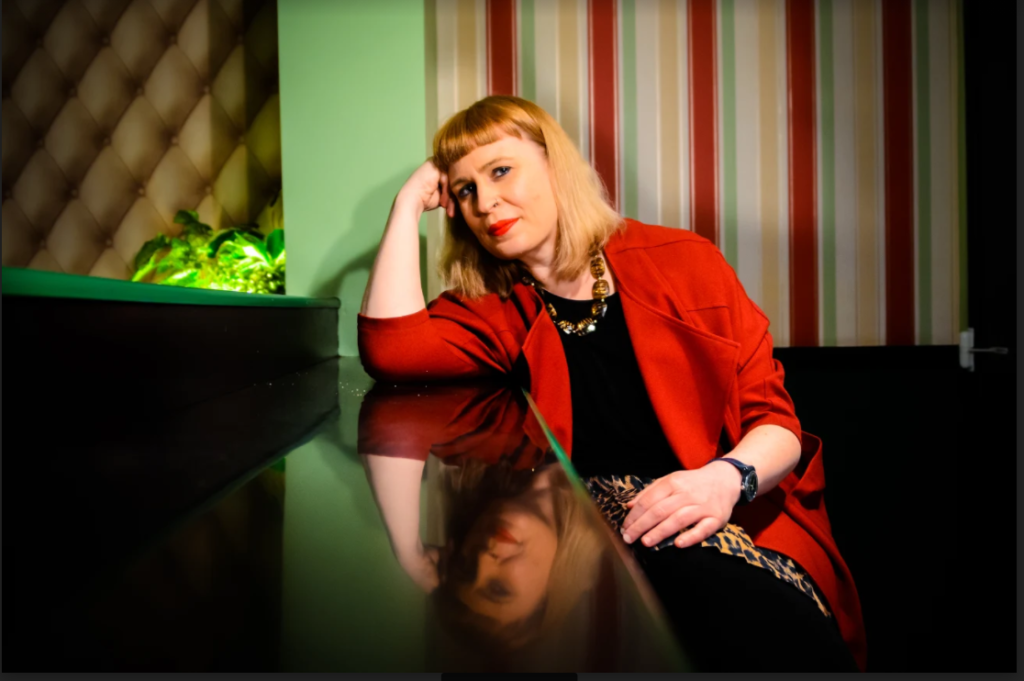Writer and community arts facilitator Jan Carson spoke to Northern Slant about the role of artists and art in the community, the effects of the pandemic, arts policy and the profile of art from Northern Ireland. In the second of two articles, Jenny McCullough talks to Jan about her new book and her other projects, and about influence and inspiration in writing from Northern Ireland.
Mid-Zoom, Jan Carson points at her bookshelves and says, “You can probably tell from looking behind me that I’m not a minimalist. I’m not a minimalist in how I do writing; I’m not a minimalist in how I do life. I just want it all.”
With a writer who is interested in and engaged with so much in the world, never mind one who has created and worked right through the pandemic, there’s a lot to talk about. That’s my excuse for taking a whole interview — from violence in the streets to arts in the community to arts policy in the pandemic — to ask about the book that she is meant to be promoting.
The Last Resort
The Last Resort began two years ago as a commission for a series of stories to be broadcast on BBC Radio Four but ended up being written over about six weeks in the spring of 2020 and is the second book by Jan to be published during the pandemic (Postcard Stories 2 appeared in the summer). Each story belongs to a character who is staying at a north coast caravan park, part of which is perilously close to falling into the sea. Rich in language and physical and mental settings that are peculiar to Northern Ireland, the stories also manage to bring out universal truths about family relationships.
The stories are just as fun, and funny, as they are poignant and haunting. BBC Sounds hosts the series, performed as monologues by tremendous local actors, and the collection published by Penguin is to be read, reread and treasured. I only just resist the temptation to ask how the characters and the caravan park have fared during lockdown, and whether there are more stories to come from the site.
The caravan park turned into a way of exploring how lockdown had “pushed us together but also compartmentalised us”, Jan says. She loves the metaphor of a static caravan, with its echoes of home.
“It’s an oxymoron in that it’s meant to go somewhere but it isn’t and that to me is Northern Ireland … it has the potential to go somewhere but it never seems to get up and move.”
There is a “filmic dourness” about a caravan holiday in the rain, she says, with “very staid games of UNO and telling ourselves we were having a good time.” In The Last Resort, unreconciled issues and feelings that simmer beneath the surface are given expression not only by the characters’ own thoughts but also the manifestation of magical elements in the world around them.

The Last Resort was released in April
“Seeing the potential in people”: Magic realism and new writing traditions in Northern Ireland
Jan Carson’s writing, which invests the authentic and resonant representation of people and places with mythical, magical and miraculous properties, makes her a one-person genre in Northern Ireland. Her powerful example is surely inspiring other writers to prevent this being the case for long, but for now, barring half a dozen or so books that “tip into” magic realism, there has been “no tradition of anything but realist linear fiction in Northern Ireland” since CS Lewis.
Jan isn’t complaining about that tradition, but she is fascinated by the contrast between Northern Ireland and other places that struggle with conflicts and tension between identities, because, she says, magic realism usually comes from these places. She wonders whether we have lost our ability to imagine.
Jan’s key text and “favourite book in the whole world” is Midnight’s Children by Salman Rushdie, who gives young Saleem special abilities so that “you see something more than just a kid at the side of the street in India.” Playful as the magic realist technique can be, it is something more than just a literary device for Jan, who says:
“You don’t look at kids and think, you know, that wee lad in the hoodie and North Face jacket is capable of something wonderful and incredible. Until we start seeing the potential in people, we are just going to keep reducing them.”
Magic in Jan’s writing is an elevating element and magic realism appeals because it gives her a way of saying, “these people are not just bog standard: they are capable of something wonderful or miraculous.” The belief that everyone has value that pervades her work shows the influence, she says, of her own Protestant evangelical background.

Jan has spent more than 20 years as a community arts facilitator
Other experiences, other voices: Imagination and the art of inclusion
In the year of the pandemic, Jan has written a single, up-to-the-moment monologue — In the Pause Between Now and Next — about life in isolation, online and offline, produced in partnership with the Lyric theatre and the Irish Arts Center, New York. She has also written five monologues commissioned by NI Screen in response to the documentaries that John T Davis made in the 1980s about street preachers in the evangelical Protestant community. Jan’s job has been to “put the women back in”.
Presenting the women’s experiences of that world is important, says Jan, “because they’re a whole community that hasn’t really been explored or looked at on any level … there are so many women who grew up in that world and who are still there and are silenced.” In one way, the community is a phenomenon of Northern Ireland. In another, Jan says, “it’s not that different” from other religious groups in which women must keep silent in the presence of men, keep their heads covered and keep the sandwiches and traybakes (or equivalents) coming.
Another way for Jan to strive for a more inclusive and diverse kind of creativity is through her work with Queen’s University on its Dementia Fiction research project. She is working on a two-day festival that will bring people who are living with dementia together with writers who have explored the subject, academics and community organisations.
Lack of diversity in this genre is an issue that has rapidly emerged through the project, and Jan is keenly aware that her own character Martha in The Last Resort is an older lady with dementia whose family has the financial means to support her. Dementia-related stories tend to skew towards middle- and upper-class characters, and even though Black men are in a high-risk category for dementia, of the 80 or 90 novels featuring dementia that Jan has read, only two feature Black characters.
Expanding the lexicon
As well as working, amongst many other things, on the monologues, a new radio series, an academic paper and her next novel, Jan is editing an anthology of newly commissioned short stories about dementia. When she tells me that in the early stages of dementia your lexicon diminishes and your word variation reduces, it strikes me that in all her work — as writer, community arts facilitator, campaigner and critical friend — Jan Carson has dedicated herself to enriching and expanding the lexicon of life in Northern Ireland. She does want it all, not just for herself but for all of us.
You can read the first of two articles with Jan Carson here: The State of The Arts: In Conversation with Jan Carson.
